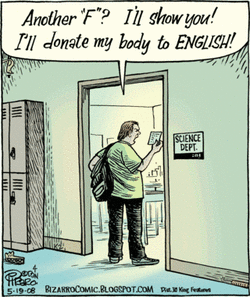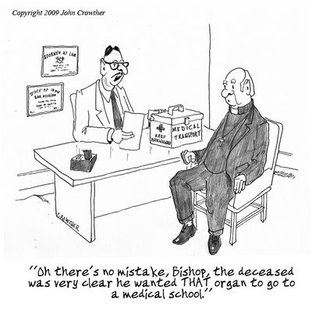 I got in a long discussion the other day about why people will choose to be organ donors. In a vacuum of social behavior, the basic act of donating ones organs after death has no impact on the person doing the donating. After all, they don't have any claim to the organs anymore and any good the organs can do will not bother them... they are dead after all. Therefore in the social vacuum, the case can be made that organ donation wouldn't survive much as a practice, as there is no real good "reason" to do it. If there was any slight pressure to keep ones organs intact after death (say a religious preference, etc.), then likely there would be no organ donors. So the question became, then, why do people donate their organs? What is it that encourages people to break this ambivalence towards what happens to the world after death? The easy answer is "a desire for their progeny to benefit from the medical progress their organs can help further". This is a cheap, 'evolution trumps all' type answer, and may be the right one. Those who are genetically predisposed to use all means to further their progeny will see their genes propagated further. And it is likely that the diseases you have that you may contribute to curing will be those of your kin, so your impact of donation is maximized amongst those who share your genes.  The problem is, organ donation is not assumed (both popularly and in fact) to be benefiting people close to you... rather it is generally seen as a societal benefit, you are doing some good for people who are ill, weak, etc, etc. and not those near to you (people near to you are the ones who are more likely to dislike the idea of your body being "mutilated" post-mortem. In the light of this fact, I think it is best to consider a "contractarian" point of view. In brief, the reason I agree to donate my body to science is selfish and societally driven. If another person dies, and their body can benefit me if it goes to scientific research, this is good for me. I like it when other people agree to donate their bodies to science! So I pressure them to do so. In return, I submit to the pressure that they levy on me to benefit their lives. I hope, in the bargain, that enough people die before I do to prolong myself. And so we sign what is, in a sense, a social contract to donate our bodies to science. What the hell does this have to do with climate science (and a host of other topics)? Consider the possibility that organ donation is a known science, but there is some reason that we will never experience the positive outcome of anyone livings organs. For example, suppose there was some scientific reason that organs, once obtained from a dead body, must wait in seclusion for 100 years before they matter to me. Encouraging other people to donate their organs won't benefit me, I'll never reap the rewards. If people in the past donated their organs, this is also no encouragement for selfish me to donate my organs upon death, because I can't enroll myself in a mutually beneficial social contract. It would seem in this framework that organ donation would die out as a practice.
This is extremely strongly evidenced in climate change mitigation. We have no real method of having our actions altering the climate we will experience, and it is therefore hard to engage in a social (or real) contract in which parties will agree to limit their emissions, even when there is clear evidence that doing so is necessary to limit the impacts of greenhouse gas emissions. It seems the contractarians have it. Comments are closed.
|
AuthorOceanographer, Mathemagician, and Interested Party Archives
March 2017
Categories
All
|
 RSS Feed
RSS Feed
